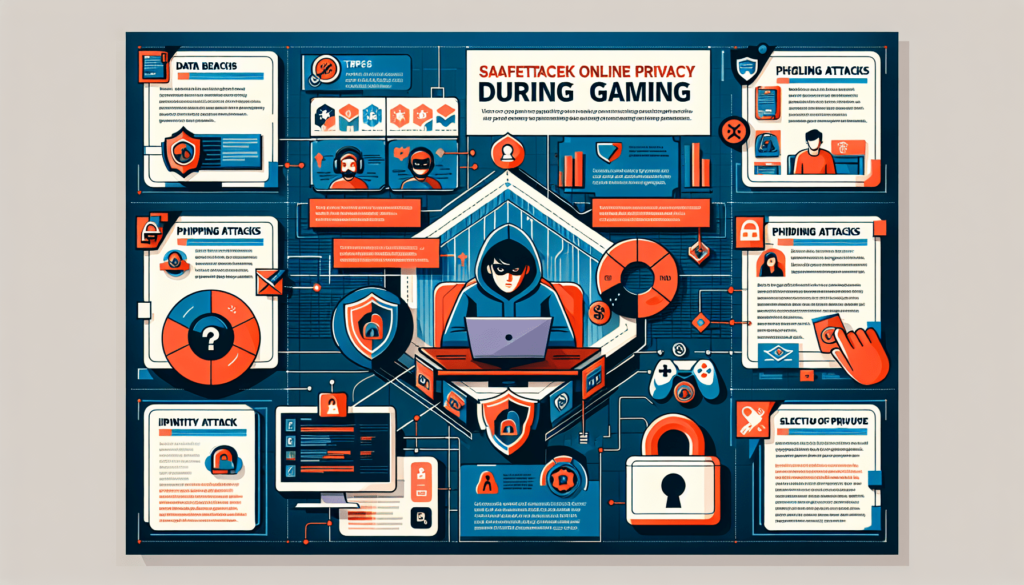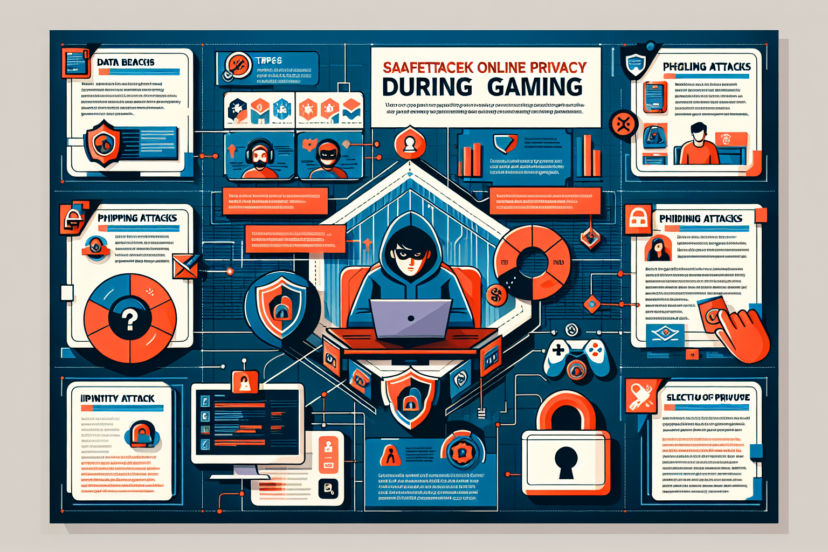How Can I Protect My Online Privacy While Gaming?
We all love the thrill of online gaming, but have you ever stopped to think about the potential risks to your privacy? In this article, we will explore some simple yet effective strategies to keep your personal information secure while immersing yourself in the virtual world. From using strong passwords to optimizing your privacy settings, we’ve got you covered. So, sit back, relax, and let us show you how to safeguard your online privacy while gaming.

Use Strong and Unique Passwords
When it comes to protecting your online privacy while gaming, one of the most crucial steps you can take is to use strong and unique passwords. Creating a complex password is key to ensuring that your gaming accounts remain secure. Avoid using easily guessable combinations such as “123456” or “password.” Instead, opt for a password that consists of a mix of uppercase and lowercase letters, numbers, and special characters.
Another important aspect is to avoid using personal information in your passwords. Hackers often attempt to gain unauthorized access to accounts by using information such as the player’s name, birthdate, or favorite sports team. By using unrelated and random combinations for your passwords, you make it much more difficult for cybercriminals to crack them.
To keep track of multiple strong and unique passwords across various gaming platforms, consider using a password manager. These convenient tools allow you to store all your passwords securely in one place, requiring you to remember only one master password. Many password managers also offer additional features like password generation and automatic form filling, making your gaming experience more secure and hassle-free.
Enable Two-Factor Authentication
In addition to using strong passwords, enabling two-factor authentication (2FA) adds an extra layer of security to your gaming accounts. 2FA requires users to provide two forms of verification to access their accounts, usually involving something they know (like a password) and something they have (like a mobile phone).
Setting up 2FA is simple and highly effective in preventing unauthorized access to your gaming accounts. Most gaming platforms offer options for 2FA, and it is highly recommended to enable this feature whenever possible. Authenticator apps or hardware keys, such as Google Authenticator or YubiKey, are reliable methods to generate the second verification code. These apps or keys generate a time-based code that you will need to input along with your password when logging in.
Remember to regularly review your trusted devices list if your gaming platform allows it. This helps ensure that only authorized devices can access your account and can help detect any suspicious activity.
Be Mindful of Sharing Personal Information
When engaged in online gaming, it is important to exercise caution when it comes to sharing personal information. Avoid sharing personal details in public chats, as these conversations can be easily accessed by anyone in the game. Be aware that sometimes other players may not have the best intentions, and sharing personal information could potentially lead to privacy breaches or even identity theft.
Similarly, when interacting with fellow gamers, be cautious about sharing personal information. While you may feel a sense of camaraderie and trust with other players, it is important to remember that not everyone may have genuine intentions. Exercise sound judgment and only share what you are comfortable with.
Furthermore, it is vital to regularly review your privacy settings on gaming platforms. Many platforms have extensive privacy controls that allow you to limit the visibility of your personal information and gameplay activity. Take the time to familiarize yourself with these settings and adjust them according to your preferences to enhance your online privacy while gaming.
Protect Your Gaming Accounts
Ensuring the security of your gaming accounts should be a top priority. To safeguard your accounts, enable account recovery options, usually in the form of a secondary email address or phone number. By doing so, you provide an additional layer of protection and enable the account recovery process in case your account is compromised.
Regularly monitor your account activity to detect any suspicious or unauthorized access attempts. Most gaming platforms offer account activity history, allowing you to review logins, device information, and gameplay sessions. If you notice any unfamiliar activity, change your password immediately and report the incident to the game provider.
To stay updated on any changes made to your account, enable notifications for account modifications. This way, you will receive alerts if someone attempts to change your password, email address, or other account settings. By staying vigilant and proactive, you can effectively protect your gaming accounts from unauthorized access.
Use Secure Wi-Fi Networks
The security of your internet connection matters greatly when it comes to maintaining online privacy while gaming. Avoid using public Wi-Fi networks, such as those available in cafes, airports, or public spaces. These networks are often unsecured, meaning that your online activities can be easily intercepted, potentially compromising your personal information.
Whenever possible, use a virtual private network (VPN) when gaming. A VPN encrypts your internet traffic, making it extremely difficult for hackers or eavesdroppers to intercept your data. It also hides your IP address, providing an additional layer of anonymity by masking your physical location.
Securing your home Wi-Fi network is equally important. Change the default password provided by your internet service provider (ISP) and ensure your Wi-Fi network uses strong encryption, such as WPA2. Regularly update your Wi-Fi router’s firmware to fix any security vulnerabilities and prevent unauthorized access to your home network.
Ensure Game Privacy Settings Are Enabled
Protecting your online privacy while gaming includes paying attention to the game’s privacy settings. Review and adjust the privacy settings within your games to align with your desired level of privacy. These settings often allow you to control who can see your profile, personal information, and in-game activities.
It is advisable to limit the personal information displayed in your profile. Consider sharing only the necessary details, such as a username or nickname, while keeping private information undisclosed. By minimizing the amount of personal information displayed, you reduce the risk of potential privacy breaches.
Furthermore, disable location tracking in games whenever possible. Some games have features that track and display your physical location to other players. While this can enhance certain gameplay experiences, it also poses a risk to your privacy. Unless necessary for the game, it is best to disable location tracking to protect your personal information.
Beware of Phishing Attacks
Phishing attacks are a common way for cybercriminals to acquire sensitive information from unsuspecting gamers. They often disguise themselves as legitimate entities, such as game providers or fellow players, attempting to trick you into sharing personal information or clicking on malicious links.
To protect yourself, be cautious of suspicious links and emails. Be particularly skeptical of emails or messages that require urgent action or request personal information. Verify the legitimacy of gaming-related emails by contacting customer support directly through official channels, such as the game’s website or support email address.
If you encounter any phishing attempts, promptly report them to the respective game provider. By doing so, you not only protect yourself but also contribute to keeping the gaming community safe from potential scams.
Update Your Games and Devices Regularly
Regularly updating your games and gaming devices is essential for maintaining a secure gaming environment. Game developers often release updates to fix bugs, address security vulnerabilities, and provide new features. By keeping your games up to date, you ensure that you have the latest security patches and improvements, reducing the risk of potential exploits.
Similarly, it is important to install security patches and updates for your gaming devices. Whether you are gaming on a console or a PC, your device’s operating system, firmware, and gaming software should always be up to date. Many updates include security enhancements that protect against known vulnerabilities and keep your gaming experience safer.
To simplify the update process, enable automatic updates whenever possible. This ensures that the latest updates are downloaded and installed without requiring manual intervention. By staying up to date with your games and devices, you can enjoy a safer and more secure gaming experience.
Use Anti-Malware Software
Protecting your gaming system from malware is crucial to maintain online privacy. To do so, install reputable antivirus and anti-malware software. These applications help detect and remove various types of malicious software, such as viruses, trojans, keyloggers, and spyware, which can compromise your privacy and security.
Regularly scan your system for malware using your chosen security software. Schedule scans to occur at set intervals or perform manual scans when you suspect any suspicious activity. Detecting malware early can prevent it from causing further harm to your system and gaming accounts.
Additionally, keep your security software up to date. Software updates often include new threat definitions and improved detection techniques, ensuring that your system remains protected against the latest malware threats. Regularly check for updates and enable automatic updates whenever possible to ensure continuous protection.
Monitor and Manage In-Game Friends
While making friends and building relationships in online gaming communities can be enjoyable, it is important to exercise caution and manage your in-game friends wisely. Be selective about accepting friend requests and only add people you genuinely trust and know well. Remember, once someone becomes your friend in-game, they may have access to certain personal information you have chosen to share.
Regularly review your friend list and remove any inactive or suspicious friends. By doing so, you reduce the risk of potential privacy breaches and maintain a tighter-knit and more secure group of friends within the gaming community.
Set privacy restrictions for in-game friends whenever possible. Many games offer options to limit the information accessible to your friends, such as restricting access to your gameplay activity or personal details. Adjust these settings based on your comfort level and the level of privacy you desire.
In conclusion, protecting your online privacy while gaming requires a proactive approach. By following these guidelines, such as using strong passwords, enabling two-factor authentication, being mindful of personal information sharing, protecting gaming accounts, using secure Wi-Fi networks, adjusting game privacy settings, being cautious of phishing attacks, updating games and devices regularly, using anti-malware software, and monitoring and managing in-game friends, you can significantly enhance your online privacy and security while enjoying your favorite games. Stay safe, and happy gaming!




